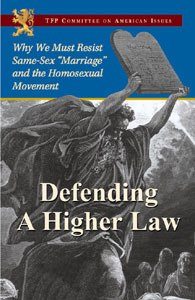
Nothing evokes a fresh start like the beginning of something. Be it the start of the day, the week, the month, the year or the decade. Hope grows as one period ends and another begins. In school, students experience hope when a semester ends, and another begins.
In times of major change, an inner feeling tells us we can leave all our disappointments, tragedies, shortcomings and failures in the past. Hope reinforces the notion that things can change for the better. Without the possibility of change, hope is replaced by despair.
One main myth of LGBT proponents is that people who have same-sex attraction (SSA) are unable to change and begin anew. However, there is a movement challenging this notion. And it is growing. Its very existence can provide hope for those suffering from the despair of thinking they cannot change.
Freedom Means Change
The movement is called the Freedom March. It is composed of people who have abandoned the LGBT lifestyle.
The first Freedom March happened in Washington, D.C., in 2018. It gathered a little over two dozen people. In 2019, the group’s web site says there were hundreds. This year they have three events scheduled in Boston, Washington, D.C., and Atlanta.1
Pro-LGBT blogs and news outlets were quick to condemn the movement. The Friendly Atheist, published online at Patheos, made light of the small number.2 A spokesman for Stonewall, a major LGBT magazine, said: “Marches like this try to suggest that same-sex attraction is something that can be ‘fixed’ or ‘cured.’ But we know that while sexual orientation can certainly be fluid, it cannot be forcibly changed by external forces.”3
10 Razones Por las Cuales el “Matrimonio” Homosexual es Dañino y tiene que Ser Desaprobado
However, despite the scorn and vehement rejection of LGBT advocates, it can no longer be denied that hundreds claim they have changed.
The Unlikely Heralds of Change
Two of the group’s charter members are unlikely candidates to found such an organization. The two men survived the shooting at the Pulse Nightclub in 2016, where 49 people were killed and 53 injured. Angel Colon was shot six times and left for dead. Luiz Ruis was trampled down by the crowd fleeing from the shooter. The Pulse was a club frequented by the LGBT crowd where Colon was a dancer, and Ruis was a patron.4
Both later joined movements with the same message: Change is possible. Angel Colon founded Fearless Identity. Its web site has a picture of a group of people wearing t-shirts with the word “Changed” printed on them. All claim to have turned away from the LGBT lifestyle.
According to their testimonials, two types of change are possible. One change is the complete reversal of their “sexual orientation.” The other is the rejection of the LGBT lifestyle by fighting against their sexual inclinations and living chastely. Both are acceptable under Catholic morality.
Taking a Principled not a Personal Stand
As practicing Catholics, we are filled with compassion and pray for those who struggle against violent temptation to sin, be it toward homosexual sin or otherwise.
We are conscious of the enormous difference between these individuals who struggle with their weaknesses and strive to overcome them and others who transform their sin into a reason for pride, and try to impose their lifestyle on society as a whole, in flagrant opposition to traditional Christian morality and natural law. However, we pray for them too.
According to the expression attributed to Saint Augustine, we “hate the sin but love the sinner.” And to love the sinner, as the same Doctor of the Church explains, is to wish for him the best we can possibly desire for ourselves, namely, “that he may love God with a perfect affection.” (St. Augustine, Of the Morals of the Catholic Church, No. 49, www.newadvent.org/fathers/1401.htm)
Changing the Stigma
Colon and Ruiz are not alone in this movement. Other organizations involved in the march are Uprooted Heart, For Such A Time Ministry, Overcome Ministry, and Red Hause.5
The movement is growing and gaining momentum. Hundreds of former homosexuals, lesbians, and transsexuals are now—for lack of a better expression—coming out of the closet. This is ironic since the LGBT advocates complain about the stigma of “coming out of the closet.” Yet active homosexuals unscrupulously dish out insults and bully to those who have turned away from the LGBT lifestyle.6 Despite this abuse, members of this movement are not afraid to come out.
FREE READ: Defending a Higher Law: Why We Must Resist Same Sex “Marriage” and the Homosexual Movement
The CEO of Uprooted Heart, Inc., M.J. Nixon, also a co-founder of the Freedom March, offers a book on her organization’s web site. The book, Changed, is a compilation of several dozen testimonials from people who have turned away from the LGBT lifestyle. The popular book was reprinted with 15 new stories in its second edition. Some of the stories tell of struggles to resist temptation. Others claim to have overcome their homosexual inclinations and have even started families.
Why Change
Those who change give many reasons for their conversions, many of which are religious. Christian values are the main motivation since they provide a path away from sin. God’s grace also gives souls the strength to overcome their weaknesses and make major changes.
Another reason why people change is the failure to find happiness in the LGBT lifestyle. Sin can never be a source of true happiness. It only brings momentary pleasure. And, when the journey of life is full of sinful pleasures, guilt and conscience always come along for the ride. Nothing ruins a journey more than unpleasant companions. Understandably, many want out.
Ronald McCray, says that “[the world] made you think that people in the homosexual lifestyle (…) were full of happy people. And, it sounded like it was the life to live.” But he and others testified that the depression became worse the more they gave in to the lifestyle.7
Freedom March testimonials viewable on Youtube talk about this unhappiness. They express this in several ways: the sense of unfulfillment, the lack of true relationship or the emptiness that they feel after they commit sins.8
Learn All About the Prophecies of Our Lady of Good Success About Our Times
The extent of this unhappiness suffered by those living the LGBT lifestyle is supported by many studies published on the National Institutes of Health web site. One study published it the American Journal of Men’s Health says: “The prevalence of depression among gay men is three times higher than the general adult population. Because depression is a known risk factor for suicide, gay men are also at high risk for suicidality.”9
The National Alliance on Mental Health Illness reports that this group is at a higher risk than the general population for suicidal thoughts and suicide attempts; high school students who identify as lesbian, gay, or bisexual are almost five times as likely to attempt suicide compared to their heterosexual peers; and, 48% of all transgender adults report that they have considered suicide in the past 12 months, compared to 4% of the overall U.S. population.10
Despite glamorized portrayals by the entertainment and literary media, those in the LGBT lifestyle are not happy. They are plagued with spiritual and mental problems brought about by the harsh life of sin.
The testimonies in the documentary, Here’s My Heart, tells how conversions usually happen at the height of unhappiness. Conversions also bring with them the hope that they can change.
Hope of a Hopeless World
Is There a Bridge to Hope?
These conversions, however, are complicated by those who discourage people from taking the step. This can be seen in the “ministry” of Fr. James Martin. The premise of his book, Building a Bridge: How the Catholic Church and the LGBT Community Can Enter into a Relationship of Respect, Compassion, and Sensitivity, is that not only did God make LGBT people the way they are but that the Church should accept them as blessings from God.
Fr. Martin uses the Pulse Nightclub shooting as the event that prompted him to write his book.
One wonders what he would say to a former homosexual who was shot that night and who no longer lives a life of sin and advocates conversion. Would Fr. Martin still claim that God makes the person that way? If he were to become aware that many abandoned the LGBT lifestyle for a Christian lifestyle, would he build a bridge to them as well? If he were to know that change is, in fact, possible, would he still deny sinners hope by neglecting to talk about the possibility of conversion?
A Great Gift to Change Society
Many family members and friends have not broached the topic of conversion to their loved ones suffering from same-sex attraction and especially to those completely given in to the LGBT lifestyle. They have accepted the myth that change is not possible. So, they watch loved ones suffer through depression helpless.
Irresistible Novena to the Sacred Heart of Jesus
Because of this new movement, it has now become easier to counter these arguments. No longer do those who suffer feel trapped in the LGBT lifestyle. Freedom is possible. No longer do they have to be enslaved by sin. Conversion is possible. God’s grace can enter the souls of people and change them. The sacramental ministry of the Church can provide forgiveness, repentance and nourishment. In this vale of tears, fallen humanity can thus find some degree of happiness.
If others have found happiness in conversion, so can they. If others can change, so can they. If others have found hope, so can they.
The English language expresses hope in many ways: a new beginning, a fresh start, a new start, to start over, to start a new life, to wipe the slate clean, and to turn over a new leaf.
Those suffering depression in the LGBT lifestyle are often denied the hope of change. Perhaps, if they learn of the Freedom Movement, they will find out that thousands have changed and are happier for it. Hope is the only cure for depression and suicide. It is a spiritual act of mercy to help them learn they can escape the fetters of sin. If this is done with charity and much prayer, it can plant the seed of hope in their hearts.
Footnotes
- https://www.freedomtomarch.com/new-events
- https://friendlyatheist.patheos.com/2019/05/26/once-again-tens-of-people-show-up-to-christian-anti-lgbtq-freedom-march/
- https://www.newsweek.com/what-freedom-march-ex-gay-people-washington-dc-911882
- https://www.nbcnews.com/feature/nbc-out/pulse-shooting-survivors-organize-ex-gay-freedom-march-orlando-n1044581
- https://www.freedomtomarch.com/our-vision
- https://www.youtube.com/watch?v=_NGxOht70g0
- https://heresmyheartdocumentary.com/
- https://www.youtube.com/watch?v=nmYSxOocyGg
- https://www.ncbi.nlm.nih.gov/pmc/articles/PMC5675322/
- https://www.nami.org/find-support/lgbtq

